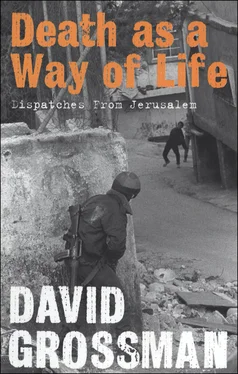David Grossman - Death as a Way of Life
Здесь есть возможность читать онлайн «David Grossman - Death as a Way of Life» весь текст электронной книги совершенно бесплатно (целиком полную версию без сокращений). В некоторых случаях можно слушать аудио, скачать через торрент в формате fb2 и присутствует краткое содержание. Год выпуска: 2013, Издательство: Bloomsbury Publishing, Жанр: Прочая документальная литература, на английском языке. Описание произведения, (предисловие) а так же отзывы посетителей доступны на портале библиотеки ЛибКат.
- Название:Death as a Way of Life
- Автор:
- Издательство:Bloomsbury Publishing
- Жанр:
- Год:2013
- ISBN:нет данных
- Рейтинг книги:5 / 5. Голосов: 1
-
Избранное:Добавить в избранное
- Отзывы:
-
Ваша оценка:
- 100
- 1
- 2
- 3
- 4
- 5
Death as a Way of Life: краткое содержание, описание и аннотация
Предлагаем к чтению аннотацию, описание, краткое содержание или предисловие (зависит от того, что написал сам автор книги «Death as a Way of Life»). Если вы не нашли необходимую информацию о книге — напишите в комментариях, мы постараемся отыскать её.
Death as a Way of Life — читать онлайн бесплатно полную книгу (весь текст) целиком
Ниже представлен текст книги, разбитый по страницам. Система сохранения места последней прочитанной страницы, позволяет с удобством читать онлайн бесплатно книгу «Death as a Way of Life», без необходимости каждый раз заново искать на чём Вы остановились. Поставьте закладку, и сможете в любой момент перейти на страницу, на которой закончили чтение.
Интервал:
Закладка:
Arafat, for his part, still seems to be having trouble believing that he is facing the best partner he can hope for under the present circumstances. He is haggling with Barak just as he did with Netanyahu, stubbornly holding his ground on small details. In doing so, he is contributing to the dissolution of the chance for a true, profound change in the relationship between the two peoples.
We now have an entire year ahead of us before reaching a final agreement. During this year the two sides will have to resolve the approximately 450 problems and disputes that now divide them. Is this possible? At first glance, it seems impossible. But perhaps we should see it differently. The conflict between the two peoples has almost run itself out. The majority in both nations are weary of war. The Israelis and Palestinians already know in their hearts, more or less, what dreams they will have to give up and what they will gain.
Only two things remain a riddle. We don’t know how much time will be lost until the solutions are found and how much blood will be spilt by then. Ehud Barak has, with the vision of a great leader — or with appalling naïveté—announced: Within a single year we will have a permanent status agreement.
The heart hopes that there is good sense behind this move of his, in definitively cutting the tangled Gordian knot between the Israelis and the Palestinians. But that same heart is well acquainted with the two peoples who are party to this conflict. It knows their suspicious, cynical character, their self-destructive tendencies, and the fear that has become second nature to them — the fear of believing that there is hope for another kind of life in the Middle East.
Despite this, I allow myself to celebrate today — because, despite all the doubts, and the sorrow at all the gratuitous insults they have hurled at each other, it’s clear to me today, more than it ever has been, that the hundred-year-old conflict between them has been heading in the right direction these last few years. The process of accommodation has survived repeated blows from both sides, and this may be evidence that, inside the armor that all of us in this region have become accustomed to living in, a hunger for life still has us in its grasp. We still remember what it is really worth taking a risk for.
Expulsion of the Cave Dwellers
December 1999
On November 16, 1999, the Israeli Army evacuated 750 Palestinian villagers whose families had been living in mountainside caves near Hebron in the West Bank since the 1830s. The Israeli Supreme Court ruled in March 2000 that the cave dwellers could return to their homes pending a final determination in the case. In July 2001, the Israeli Army raided the caves and expelled hundreds of people again. The struggle between the state of Israel and the cave dwellers currently awaits a final court decision. Israeli and international peace and human rights organizations mounted a massive campaign in support of the cave dwellers.
“I was born here in this cave,” said Mahmoud Hamamdeh, “and here my father was born and here my seven children were born. Give me a three-story house? Don’t want it. Give me a hotel? Don’t want it. Only here. And what has happened?”
What happened is that, three weeks ago, several dozen army armored personnel carriers and jeeps showed up. The soldiers surrounded the village of al-Mufkara on the southern flank of Mt. Hebron, cordoned off the field containing Hamamdeh’s cave and the caves of other families, as well as some tents and corrugated metal shacks, and ordered the people to leave the homes they’d been living in for decades.
Afterward the soldiers went into the caves, piled up mattresses, woolen blankets, buckets, and sacks of barley, and scuffled with frightened children and with women screaming in panic. Our soldiers opened the plywood door of the adjacent cave, where the sheep and the chickens were kept, and shooed out the livestock. They knew that their owners would run after the sheep, to keep them from getting lost in the desert, and so they did.
After a commotion that lasted for a while, the commander could report that the mission had been accomplished, or use some other sterile phrase of that sort. The cave dwellers’ belongings were impounded, and they were told, in accordance with regulations, and in absolutely clear language, that they could receive their personal effects only by paying a certain sum of money, a hundred or so dollars — that’s all.
Then the soldiers returned to the caves, just to take one last look, because they’d never ever seen anything like them. They scouted out the crevices and were astounded at how human beings could, in the final month of the twentieth century, live in moldy, dark caves, between damp stone walls, on a ground covered with ash and goat turds. Afterward, all our soldiers returned safely to their base.
There are two explanations for this action. When the residents of Ma’on Farm, a squatters’ site set up by Israeli settlers in the West Bank, were evacuated by the army, the settlers were promised “balance.” That is, action would be taken to harm the Palestinians as well. So they shouldn’t be too pleased, those Arabs. Another explanation: the army needs the field as yet another firing range for military training. (In May 1999, land belonging to sixty-nine villages in the West Bank was similarly categorized as a “closed military zone,” and no one was permitted to enter.)
In the three intervening weeks, the inhabitants of al-Mufkara have been wandering around their village befuddled, forbidden to enter. They’ve found a partial refuge in the adjacent village of Tweineh, which is no more than a gaggle of houses and some lean-tos. But Tweineh can’t take in all the refugees from the caves — almost 250 human beings — and the parched fields can’t feed the additional flocks. And there is already tension between the guests and the hosts. Says Hamamdeh: “At night, when it’s cold, they take us into their homes, but during the day they tell us to go far away.”
I stand there, at the entrance to a cave, I see and I hear, and I can’t really grasp it. What is happening here? How can it be that we, each and every citizen of Israel, are signed on to this? We fund it with our taxes, and carry it out through the sons and daughters we send to serve in the army. What is the connection between the army we knew and the institution that commits such an act against defenseless people?
There is no argument that if the country is in a war of survival, it is permitted to use all means necessary to protect itself.
But now? From our position of strength? Israel, the great military power, against those people out there in the fields, in the caves? How low can you go, and how cruel can you get?
Last Friday, in bone-chilling cold, on the main road at the edge of Tweineh, a woman sat next to a pile of mattresses. At her side, clinging to her, were several children, toddlers among them, wearing thin clothes. When she saw our little delegation, her eyes showed no zest of life or any interest. Later, without much hope, she urged one of the children to cough loudly, to elicit our pity. The boy, about nine years old, looked at us, shrugged his shoulders, and stubbornly remained silent.
At that moment he had more self-respect than I could find for myself as an Israeli.
If I could directly address Israel’s prime minister, Ehud Barak, I would say to him, Sir, I want to believe that you didn’t know exactly what was taking place there. That you had no idea how one signature of yours on a document would be translated into reality and affect individuals. I have no doubt that, had you witnessed what I saw there, in the field, in the caves, you would have canceled the decree and ordered that these people be immediately reinstated in their homes.
Читать дальшеИнтервал:
Закладка:
Похожие книги на «Death as a Way of Life»
Представляем Вашему вниманию похожие книги на «Death as a Way of Life» списком для выбора. Мы отобрали схожую по названию и смыслу литературу в надежде предоставить читателям больше вариантов отыскать новые, интересные, ещё непрочитанные произведения.
Обсуждение, отзывы о книге «Death as a Way of Life» и просто собственные мнения читателей. Оставьте ваши комментарии, напишите, что Вы думаете о произведении, его смысле или главных героях. Укажите что конкретно понравилось, а что нет, и почему Вы так считаете.












